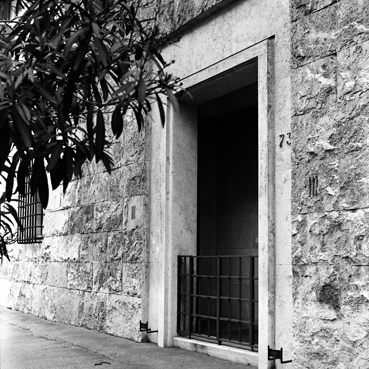-

- Entrance, head office Opus dei, Rome
The ultra-conservative, Catholic secret society Opus Dei (the name means Work of God) has more than 80 000 members - also referred to as soldiers of God - with offices in 69 countries and is also known as the Holy Mafia.
With the aid of a perfidious system of blind obedience, strict hierarchy, total self-abandonment and subordination, complete control and the formation of a mortal sin and guilt complex one tries to isolate the members in Opus Dei centers from their original family environment and establish the dependence on Opus Dei.
A rigid daily schedule, strict gender segregation and repression and desensitization of physical responses with eg a cilice spiked with thorns or self-flagellation with blows on bare buttocks are all employed to suppress any sexual feelings, physical pleasure and sensuality.
One can read this in the manifesto The Way (El Camino) by Opus Dei founder Josemaría Escrivá: »Bless the pain. Love the pain. Hallow the pain. Glorify the pain!«
Furthermore Opus Dei members are obliged to respect a list of censored books and movies, containing more than 60 000 works, including works by Berthold Brecht, Immanuel Kant, Gotthold Ephraim Lessing, Georg Wilhelm Friedrich Hegel or Charles Darwin. The members are not allowed to read these books.
What Opus Dei preaches as a spiritual discipline or sacred duty is in the end the targeted conversion of an individual and free personality into a totally uncritical and slavish follower.
This can also be read elsewhere in the manifesto The Way: »Don't forget what you are: a dustbin. Humble yourself: don't you know that you're a bucket for waste?«
Under Pope John Paul II. Opus Dei experienced a real boom and could occupy key positions in the Vatican. Even Pope Francis did not change this tradition: In September 2014, he canonized in a solemn ceremony the Opus Dei leader Bishop Alvaro del Portillo in Madrid.
Besides the Vatican Opus Dei tries to influence international organizations (eg EU or UN) and to expand into the financial sector and also particularly into the education and training system.
<< >>
